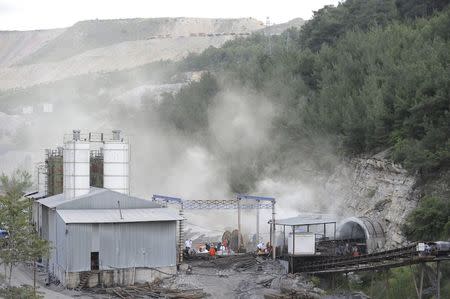Mine disaster casts spotlight on Turkey's industry regulation

By Daren Butler ISTANBUL (Reuters) - Opposition politician Ozgur Ozel held a miner's helmet aloft in parliament last month as he demanded an investigation into a spate of mining accidents in the western Turkish town of Soma. His call was rejected by deputies from Prime Minister Tayyip Erdogan's ruling AK Party, whose overwhelming parliamentary majority enables them to block almost every opposition motion. Two weeks later, some 240 workers have been pulled dead from a mine in the town and more than 100 remain trapped, a disaster likely to prove the deadliest of its kind in Turkish history. The opposition said it had only been a matter of time. As images of soot-smeared survivors and grieving families were beamed around the world, the accident threw the spotlight on Turkey's poor record on workplace safety and on what the government's critics say is its wilfully lax regulation. "Our proposal was aimed at preventing accidents like this," Ozel, a local MP from the main opposition Republican People's Party (CHP), told Reuters by telephone from Soma. He blamed leasing arrangements implemented by Erdogan's AK Party over the past decade, which allowed private firms to run formerly state-run mines, for ruining safety standards. "The only way to increase profitability is to cut down costs," he said. "Workers' health, security and accident prevention are seen by mine operators as expensive, invisible and a burden. This is where savings are made first." The Labour Ministry said late on Tuesday its officials had carried out regular inspections at the Soma mine, most recently in March, and that no irregularities had been detected. The mine's operator, Soma Komur Isletmeleri, defended its working practices on Wednesday, saying its staff were unionised and all had insurance and social security benefits, and that its site was inspected every six months. But the firm has made clear its ambition to cut costs since taking over the mine in 2005. Soma Holding owner Alp Gurkan was quoted as telling the Hurriyet daily in 2012 that his company had vowed to extract coal at just a fifth of the price incurred by the state. "Our engineers and workers didn't come from outer space. It's just a matter of good planning and implementing the private sector working style," he was quoted as saying. He said the state-run Turkish Coal Enterprises extracted coal in Soma at a cost of around $130-140 per tonne but Soma Holding guaranteed it would extract coal at a cost of $23.8 per tonne when it took over mines there in 2005. Such talk had long worried workers in Soma, a closely-knit mining district, more than a tenth of whose 105,000-strong population is employed by the industry. "We were feeling at risk after the privatisation. What they care about is making more money at the end of the day," said Hasan Dogan, 27, a relative of one of the men still trapped, watching news reports in a canteen outside Soma's hospital. "We have nothing to do but pray to Allah to deliver justice to those responsible," he said. "BLOOD-CURDLING" Erdogan has weathered nationwide anti-government protests, a corruption scandal targeting his inner circle and a public feud with an influential Islamic cleric over the past year. His ruling AK Party still dominated the electoral map in local elections at the end of March. But during a visit to Soma on Wednesday, he was publicly heckled in a square as he toured the town. He dismissed the opposition's call for a parliamentary inquiry and said such mine disasters happened all over the world. "These are normal things," he said. He reeled off a list of mining disasters around the world since 1862. Erkan Akcay, a local MP for the opposition MHP, said Erdogan's AK Party had failed to heed warnings on mine safety and that privatisation, subcontracting and leasing practices, along with inadequate inspections, had caused a rise in accidents. "The accident statistics in some private mining companies in Soma are blood-curdling," he said in a statement on his website, adding there were 5,000 workplace accidents last year in Soma alone, 90 percent of them in mines. "The responsibility for the deaths of our workers in Soma is on the shoulders of AKP deputies now making statements on television," he said. Akcay said workers died an average of 8.5 times more frequently in Turkey than in the European Union, of which Turkey aspires to be a member. There were 880,000 work accidents between 2002 and 2013, 13,442 of them fatal. Workers' Families Seeking Justice, an advocacy group for labour safety in Turkey, said at least 1,233 Turks were killed in the course of their work in 2013. In the mining sector, 61 people died in 2012, according to the International Labour Organization, which ranked Turkey the worst in Europe and third worst in the world for workers' deaths that year. Between 2002 and 2012, the death toll at Turkish mines totalled more than 1,000. Turkey's deadliest accident to date was in 1992, when a gas blast killed 263 workers in the Black Sea province of Zonguldak. Another CHP deputy, Hursit Gunes, said the party would renew its request for a parliamentary investigation. (Additional reporting by Gulsen Solaker, Ece Toksabay, Seda Sezer and Ayla Jean Yackley; Writing by Daren Butler, Editing by Jonny Hogg and Peter Graff)

